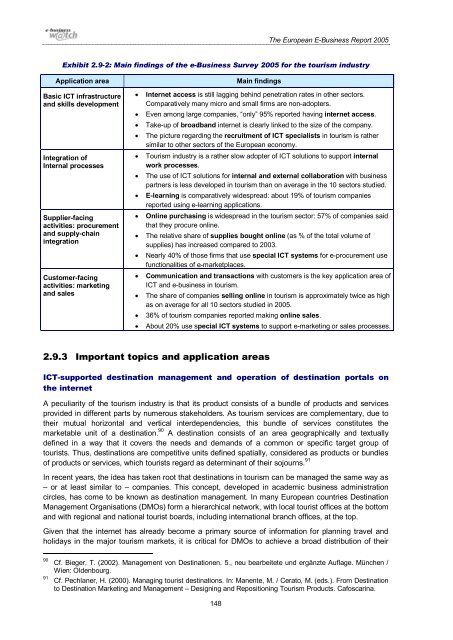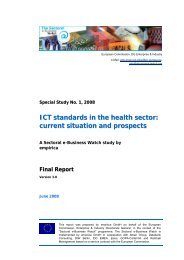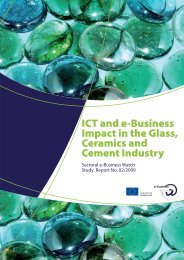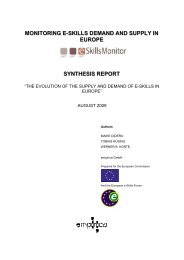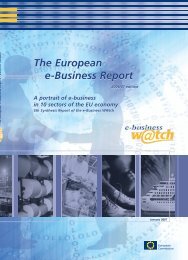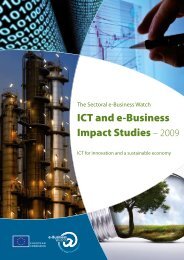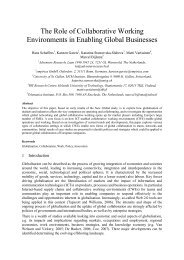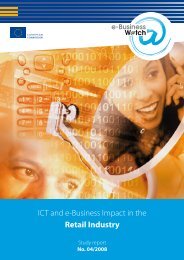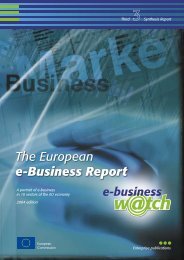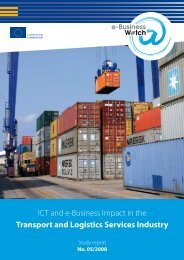The European e-Business Report The European e ... - empirica
The European e-Business Report The European e ... - empirica
The European e-Business Report The European e ... - empirica
You also want an ePaper? Increase the reach of your titles
YUMPU automatically turns print PDFs into web optimized ePapers that Google loves.
<strong>The</strong> <strong>European</strong> E-<strong>Business</strong> <strong>Report</strong> 2005<br />
Exhibit 2.9-2: Main findings of the e-<strong>Business</strong> Survey 2005 for the tourism industry<br />
Application area<br />
Basic ICT infrastructure<br />
and skills development<br />
Integration of<br />
Internal processes<br />
Supplier-facing<br />
activities: procurement<br />
and supply-chain<br />
integration<br />
Customer-facing<br />
activities: marketing<br />
and sales<br />
Main findings<br />
• Internet access is still lagging behind penetration rates in other sectors.<br />
Comparatively many micro and small firms are non-adopters.<br />
• Even among large companies, “only” 95% reported having internet access.<br />
• Take-up of broadband internet is clearly linked to the size of the company.<br />
• <strong>The</strong> picture regarding the recruitment of ICT specialists in tourism is rather<br />
similar to other sectors of the <strong>European</strong> economy.<br />
• Tourism industry is a rather slow adopter of ICT solutions to support internal<br />
work processes.<br />
• <strong>The</strong> use of ICT solutions for internal and external collaboration with business<br />
partners is less developed in tourism than on average in the 10 sectors studied.<br />
• E-learning is comparatively widespread: about 19% of tourism companies<br />
reported using e-learning applications.<br />
• Online purchasing is widespread in the tourism sector: 57% of companies said<br />
that they procure online.<br />
• <strong>The</strong> relative share of supplies bought online (as % of the total volume of<br />
supplies) has increased compared to 2003.<br />
• Nearly 40% of those firms that use special ICT systems for e-procurement use<br />
functionalities of e-marketplaces.<br />
• Communication and transactions with customers is the key application area of<br />
ICT and e-business in tourism.<br />
• <strong>The</strong> share of companies selling online in tourism is approximately twice as high<br />
as on average for all 10 sectors studied in 2005.<br />
• 36% of tourism companies reported making online sales.<br />
• About 20% use special ICT systems to support e-marketing or sales processes.<br />
2.9.3 Important topics and application areas<br />
ICT-supported destination management and operation of destination portals on<br />
the internet<br />
A peculiarity of the tourism industry is that its product consists of a bundle of products and services<br />
provided in different parts by numerous stakeholders. As tourism services are complementary, due to<br />
their mutual horizontal and vertical interdependencies, this bundle of services constitutes the<br />
marketable unit of a destination. 90 A destination consists of an area geographically and textually<br />
defined in a way that it covers the needs and demands of a common or specific target group of<br />
tourists. Thus, destinations are competitive units defined spatially, considered as products or bundles<br />
of products or services, which tourists regard as determinant of their sojourns. 91<br />
In recent years, the idea has taken root that destinations in tourism can be managed the same way as<br />
– or at least similar to – companies. This concept, developed in academic business administration<br />
circles, has come to be known as destination management. In many <strong>European</strong> countries Destination<br />
Management Organisations (DMOs) form a hierarchical network, with local tourist offices at the bottom<br />
and with regional and national tourist boards, including international branch offices, at the top.<br />
Given that the internet has already become a primary source of information for planning travel and<br />
holidays in the major tourism markets, it is critical for DMOs to achieve a broad distribution of their<br />
90<br />
91<br />
Cf. Bieger, T. (2002). Management von Destinationen. 5., neu bearbeitete und ergänzte Auflage. München /<br />
Wien: Oldenbourg.<br />
Cf. Pechlaner, H. (2000). Managing tourist destinations. In: Manente, M. / Cerato, M. (eds.). From Destination<br />
to Destination Marketing and Management – Designing and Repositioning Tourism Products. Cafoscarina.<br />
148


